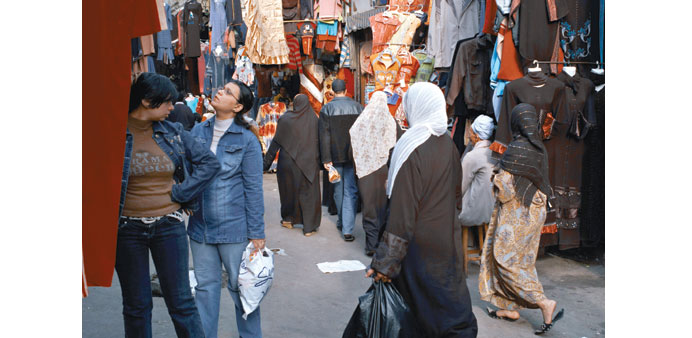People shop in a crowded market on the Muizz Il Din Street in the historic Fatimid district of Cairo (file). Egypt, which depends on imports, has faced a currency crisis since a 2011 uprising drove foreign investors and tourists away.
Reuters
Cairo
Egypt’s central bank will tighten import regulations from January in a bid to support local manufacturing and better preserve its dwindling foreign currency reserves.
Egypt, which depends on imports, has faced a currency crisis since a 2011 uprising drove foreign investors and tourists away. Hard currency reserves have more than halved $16.4bn since then.
The decision excludes imports of medicine, foods, and other essential goods such as wheat.
The central bank said it aimed to “strengthen the national economy and promote local products, enhancing their competitiveness against foreign products,” in a statement yesterday.
Egyptian manufacturers have been pushing for stricter regulations to stop importers putting artificially low values on customs bills to avoid duties, a widespread practice that makes it difficult for local products to compete on price.
Egypt had imports worth $60.8bn in 2014-15, compared with exports worth $22.1bn, said Beltone Financial economist Ziad Waleed.
“They are just fine-tuning the present regulations amid the foreign currency shortage. This definitely could increase the pressure on importers,” he said.
The statement said that banks should obtain documents for imports directly from foreign banks, instead of obtaining them from the clients as is the practice currently. This is to stop any manipulation of receipts by importers, the Egyptian customs authority said on Tuesday.
Importers will also have to provide 100% of the cash deposit on letters of credit for imports instead of the current 50%.
“The central bank is trying to use all available measures to try to limit imports and this could limit the import of luxury goods, but it is not the key solution that would solve the foreign currency shortage,” Waleed said.
Egypt’s central bank has been rationing dollars and keeping the currency artificially strong at 7.7301 through weekly dollar auctions, giving priority to imports of essential goods.
Separately, Egypt’s central bank has sold $7.6bn in recent weeks to make it easier for importers pay for goods, an official told state news agency MENA yesterday, as a currency crisis and foreign exchange curbs that have hurt trade persist.
Some of that sum was also used to pay off foreign investors in dollars, the central bank official said.
In February, the central bank imposed limits on the amount of dollars companies could put on deposit and asked banks to prioritise dollar sales to companies importing food and fuel, making it harder to clear imports of other goods that piled up at ports.
The central bank is facing mounting pressure to devalue the pound. Despite having sought to inject additional forex liquidity into the market over the past month, the gap between the official and black market rates remains wide.
Central bank forex reserves tumbled to $16.4bn in October from $36bn before the uprising, as the bank sought to defend the pound at an artificially strong level.
In rare comments, the unnamed central bank official, said Egypt’s foreign reserves were “safe” and that Egypt was committed to repaying its foreign debts on time, including a $1bn payment to Qatar in January 2016 and $700mn owed to the Paris Club.

